Accounting Theories: Agency, Stewardship Theories and IAS 37 Analysis
VerifiedAdded on 2022/10/18
|13
|2929
|14
Report
AI Summary
This report delves into three core accounting theories: agency, stewardship, and stakeholder theory. It begins with an introduction to each theory, outlining their fundamental principles and applications. The report then examines five journal papers, three focusing on agency theory and two on stewardship theory. For each paper, the report analyzes the purpose of the investigation, the theory's relevance to the purpose, the key findings, and the implications along with future avenues for research. Furthermore, the report discusses the practical implications of these theories by exploring the International Accounting Standard 37 (IAS 37) concerning provisions, contingent liabilities, and contingent assets. The discussion covers the standard's definitions, the concept of present obligations, and the accounting treatment of liabilities, providing a comprehensive overview of the theories and their practical application in financial reporting and accounting standards.
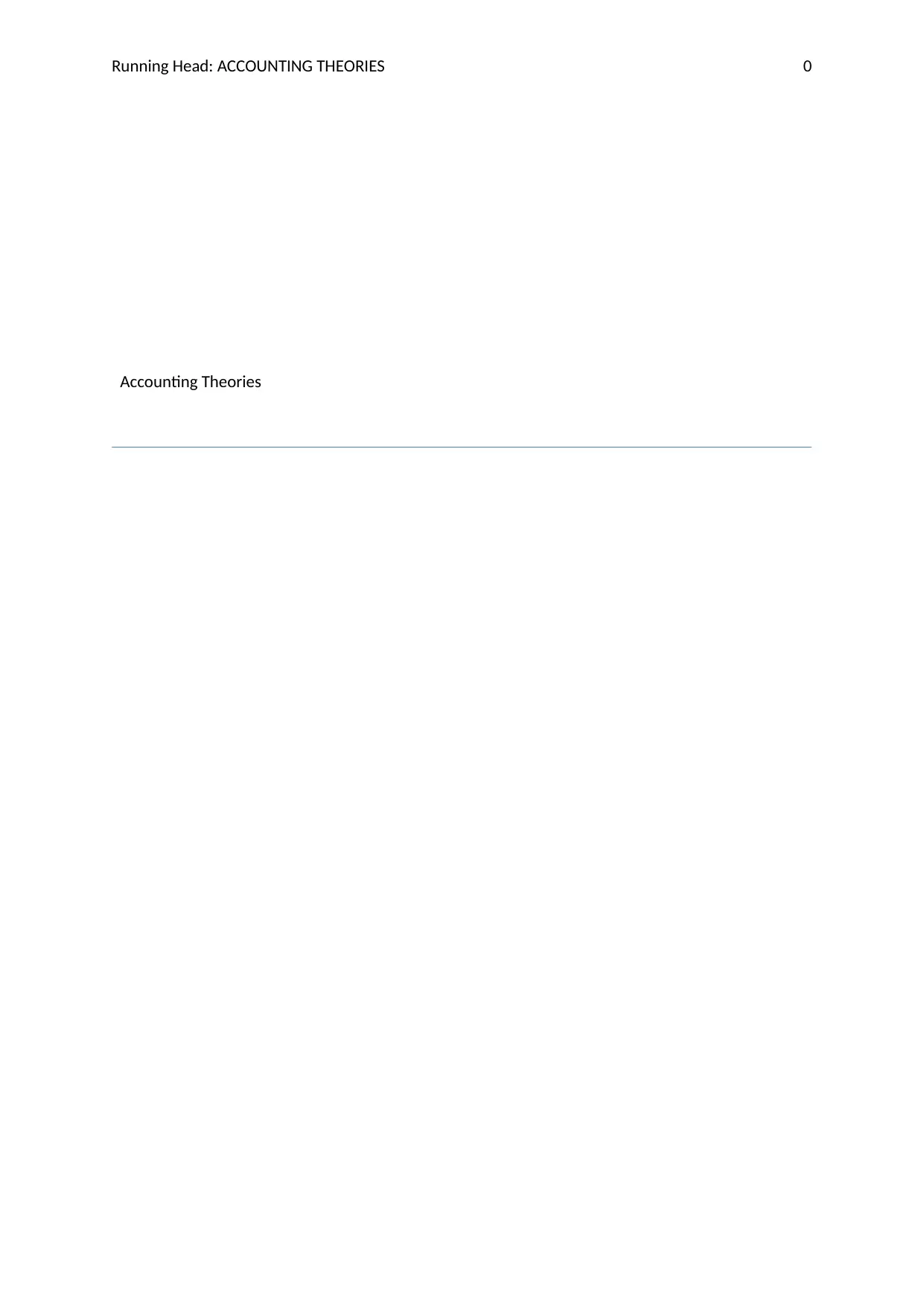
Running Head: ACCOUNTING THEORIES 0
Accounting Theories
Accounting Theories
Paraphrase This Document
Need a fresh take? Get an instant paraphrase of this document with our AI Paraphraser
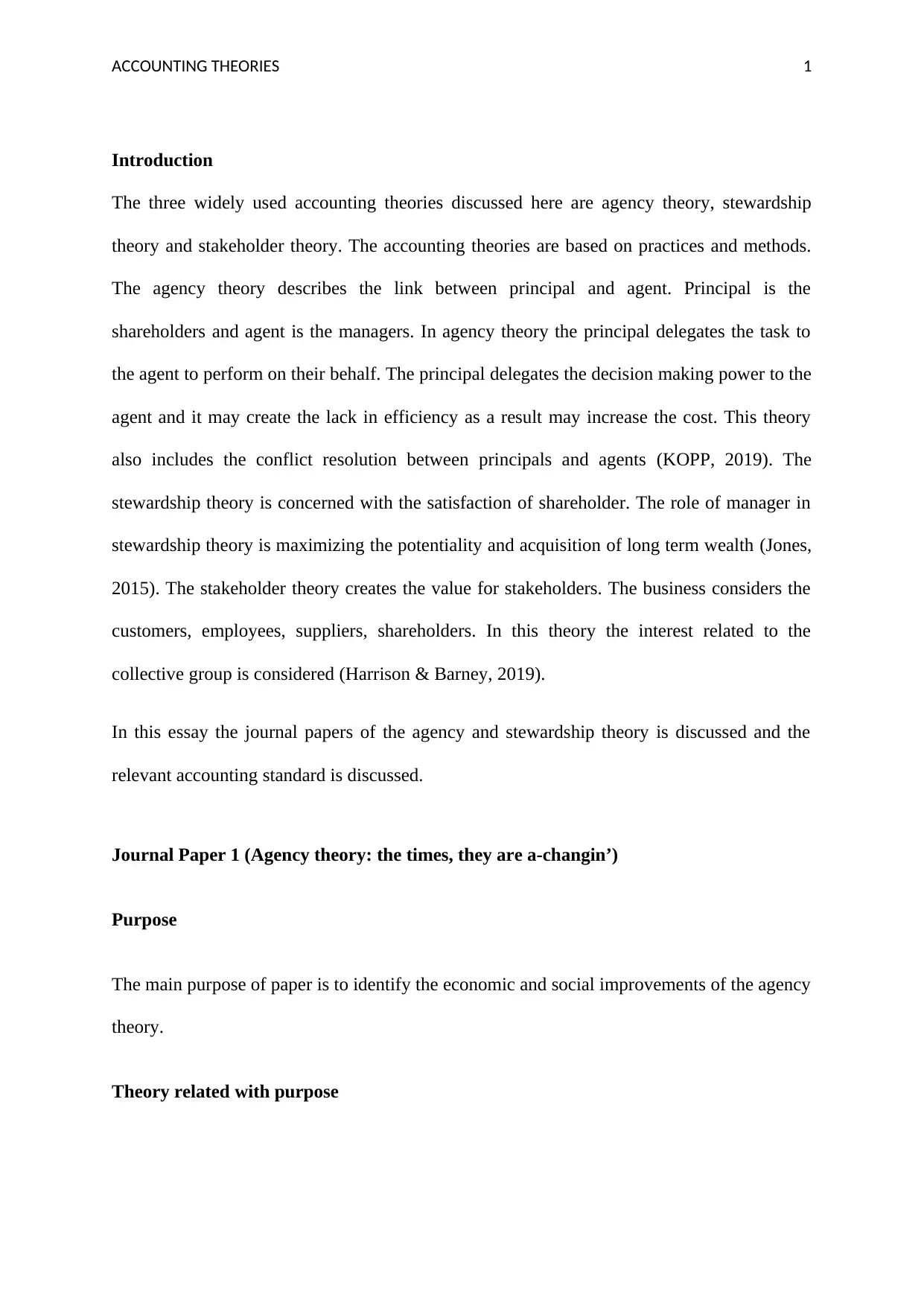
ACCOUNTING THEORIES 1
Introduction
The three widely used accounting theories discussed here are agency theory, stewardship
theory and stakeholder theory. The accounting theories are based on practices and methods.
The agency theory describes the link between principal and agent. Principal is the
shareholders and agent is the managers. In agency theory the principal delegates the task to
the agent to perform on their behalf. The principal delegates the decision making power to the
agent and it may create the lack in efficiency as a result may increase the cost. This theory
also includes the conflict resolution between principals and agents (KOPP, 2019). The
stewardship theory is concerned with the satisfaction of shareholder. The role of manager in
stewardship theory is maximizing the potentiality and acquisition of long term wealth (Jones,
2015). The stakeholder theory creates the value for stakeholders. The business considers the
customers, employees, suppliers, shareholders. In this theory the interest related to the
collective group is considered (Harrison & Barney, 2019).
In this essay the journal papers of the agency and stewardship theory is discussed and the
relevant accounting standard is discussed.
Journal Paper 1 (Agency theory: the times, they are a-changin’)
Purpose
The main purpose of paper is to identify the economic and social improvements of the agency
theory.
Theory related with purpose
Introduction
The three widely used accounting theories discussed here are agency theory, stewardship
theory and stakeholder theory. The accounting theories are based on practices and methods.
The agency theory describes the link between principal and agent. Principal is the
shareholders and agent is the managers. In agency theory the principal delegates the task to
the agent to perform on their behalf. The principal delegates the decision making power to the
agent and it may create the lack in efficiency as a result may increase the cost. This theory
also includes the conflict resolution between principals and agents (KOPP, 2019). The
stewardship theory is concerned with the satisfaction of shareholder. The role of manager in
stewardship theory is maximizing the potentiality and acquisition of long term wealth (Jones,
2015). The stakeholder theory creates the value for stakeholders. The business considers the
customers, employees, suppliers, shareholders. In this theory the interest related to the
collective group is considered (Harrison & Barney, 2019).
In this essay the journal papers of the agency and stewardship theory is discussed and the
relevant accounting standard is discussed.
Journal Paper 1 (Agency theory: the times, they are a-changin’)
Purpose
The main purpose of paper is to identify the economic and social improvements of the agency
theory.
Theory related with purpose
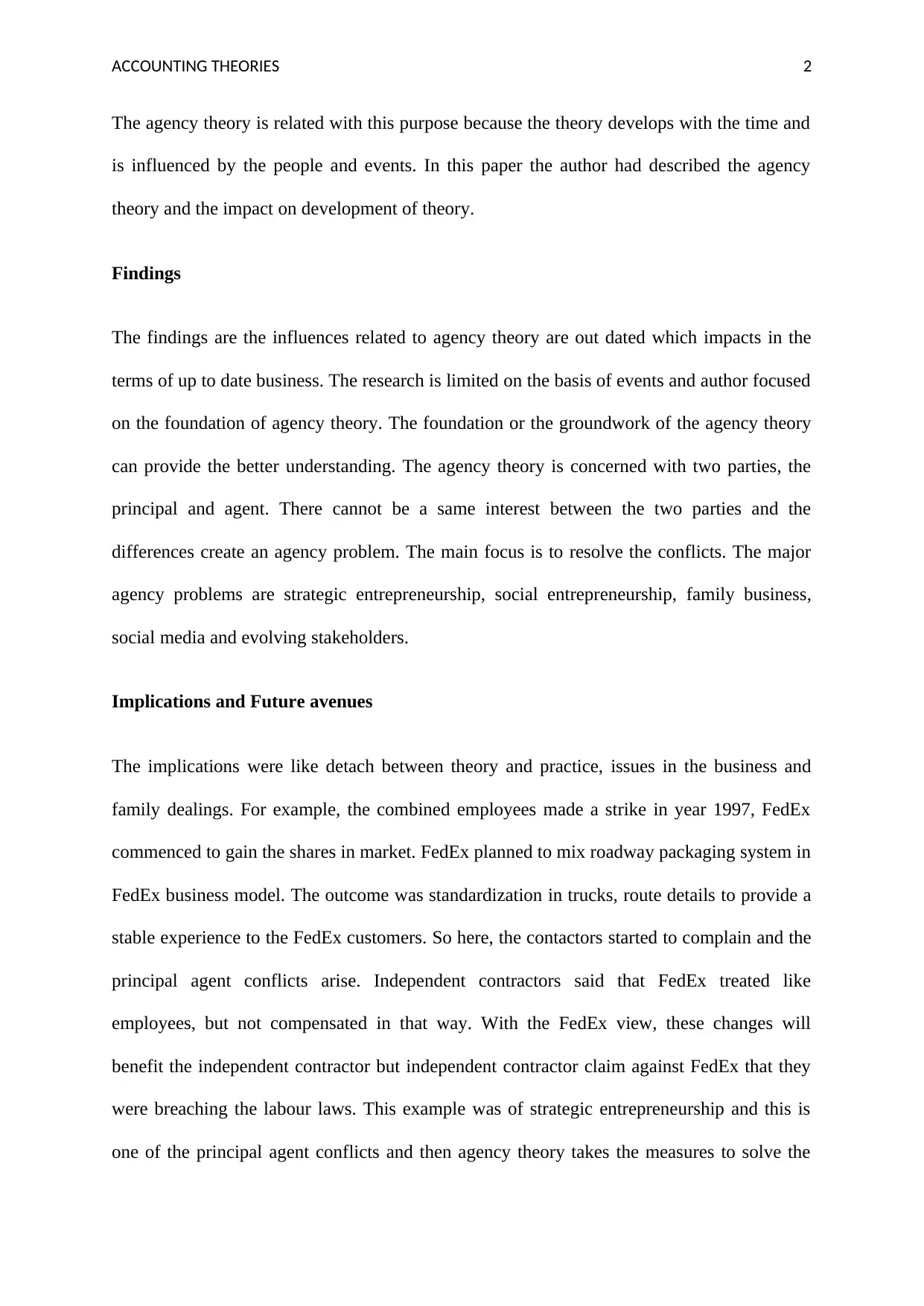
ACCOUNTING THEORIES 2
The agency theory is related with this purpose because the theory develops with the time and
is influenced by the people and events. In this paper the author had described the agency
theory and the impact on development of theory.
Findings
The findings are the influences related to agency theory are out dated which impacts in the
terms of up to date business. The research is limited on the basis of events and author focused
on the foundation of agency theory. The foundation or the groundwork of the agency theory
can provide the better understanding. The agency theory is concerned with two parties, the
principal and agent. There cannot be a same interest between the two parties and the
differences create an agency problem. The main focus is to resolve the conflicts. The major
agency problems are strategic entrepreneurship, social entrepreneurship, family business,
social media and evolving stakeholders.
Implications and Future avenues
The implications were like detach between theory and practice, issues in the business and
family dealings. For example, the combined employees made a strike in year 1997, FedEx
commenced to gain the shares in market. FedEx planned to mix roadway packaging system in
FedEx business model. The outcome was standardization in trucks, route details to provide a
stable experience to the FedEx customers. So here, the contactors started to complain and the
principal agent conflicts arise. Independent contractors said that FedEx treated like
employees, but not compensated in that way. With the FedEx view, these changes will
benefit the independent contractor but independent contractor claim against FedEx that they
were breaching the labour laws. This example was of strategic entrepreneurship and this is
one of the principal agent conflicts and then agency theory takes the measures to solve the
The agency theory is related with this purpose because the theory develops with the time and
is influenced by the people and events. In this paper the author had described the agency
theory and the impact on development of theory.
Findings
The findings are the influences related to agency theory are out dated which impacts in the
terms of up to date business. The research is limited on the basis of events and author focused
on the foundation of agency theory. The foundation or the groundwork of the agency theory
can provide the better understanding. The agency theory is concerned with two parties, the
principal and agent. There cannot be a same interest between the two parties and the
differences create an agency problem. The main focus is to resolve the conflicts. The major
agency problems are strategic entrepreneurship, social entrepreneurship, family business,
social media and evolving stakeholders.
Implications and Future avenues
The implications were like detach between theory and practice, issues in the business and
family dealings. For example, the combined employees made a strike in year 1997, FedEx
commenced to gain the shares in market. FedEx planned to mix roadway packaging system in
FedEx business model. The outcome was standardization in trucks, route details to provide a
stable experience to the FedEx customers. So here, the contactors started to complain and the
principal agent conflicts arise. Independent contractors said that FedEx treated like
employees, but not compensated in that way. With the FedEx view, these changes will
benefit the independent contractor but independent contractor claim against FedEx that they
were breaching the labour laws. This example was of strategic entrepreneurship and this is
one of the principal agent conflicts and then agency theory takes the measures to solve the
⊘ This is a preview!⊘
Do you want full access?
Subscribe today to unlock all pages.

Trusted by 1+ million students worldwide
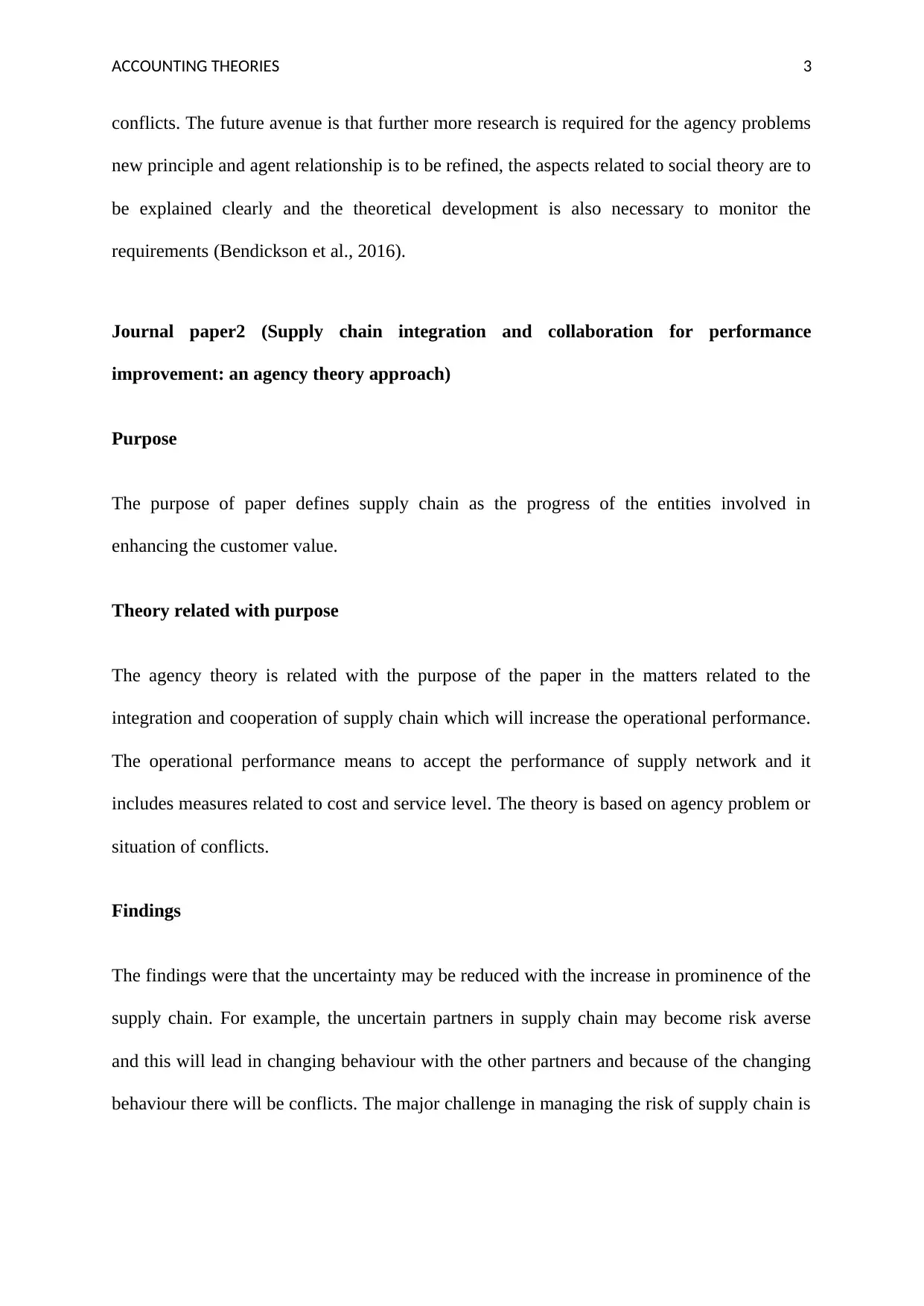
ACCOUNTING THEORIES 3
conflicts. The future avenue is that further more research is required for the agency problems
new principle and agent relationship is to be refined, the aspects related to social theory are to
be explained clearly and the theoretical development is also necessary to monitor the
requirements (Bendickson et al., 2016).
Journal paper2 (Supply chain integration and collaboration for performance
improvement: an agency theory approach)
Purpose
The purpose of paper defines supply chain as the progress of the entities involved in
enhancing the customer value.
Theory related with purpose
The agency theory is related with the purpose of the paper in the matters related to the
integration and cooperation of supply chain which will increase the operational performance.
The operational performance means to accept the performance of supply network and it
includes measures related to cost and service level. The theory is based on agency problem or
situation of conflicts.
Findings
The findings were that the uncertainty may be reduced with the increase in prominence of the
supply chain. For example, the uncertain partners in supply chain may become risk averse
and this will lead in changing behaviour with the other partners and because of the changing
behaviour there will be conflicts. The major challenge in managing the risk of supply chain is
conflicts. The future avenue is that further more research is required for the agency problems
new principle and agent relationship is to be refined, the aspects related to social theory are to
be explained clearly and the theoretical development is also necessary to monitor the
requirements (Bendickson et al., 2016).
Journal paper2 (Supply chain integration and collaboration for performance
improvement: an agency theory approach)
Purpose
The purpose of paper defines supply chain as the progress of the entities involved in
enhancing the customer value.
Theory related with purpose
The agency theory is related with the purpose of the paper in the matters related to the
integration and cooperation of supply chain which will increase the operational performance.
The operational performance means to accept the performance of supply network and it
includes measures related to cost and service level. The theory is based on agency problem or
situation of conflicts.
Findings
The findings were that the uncertainty may be reduced with the increase in prominence of the
supply chain. For example, the uncertain partners in supply chain may become risk averse
and this will lead in changing behaviour with the other partners and because of the changing
behaviour there will be conflicts. The major challenge in managing the risk of supply chain is
Paraphrase This Document
Need a fresh take? Get an instant paraphrase of this document with our AI Paraphraser
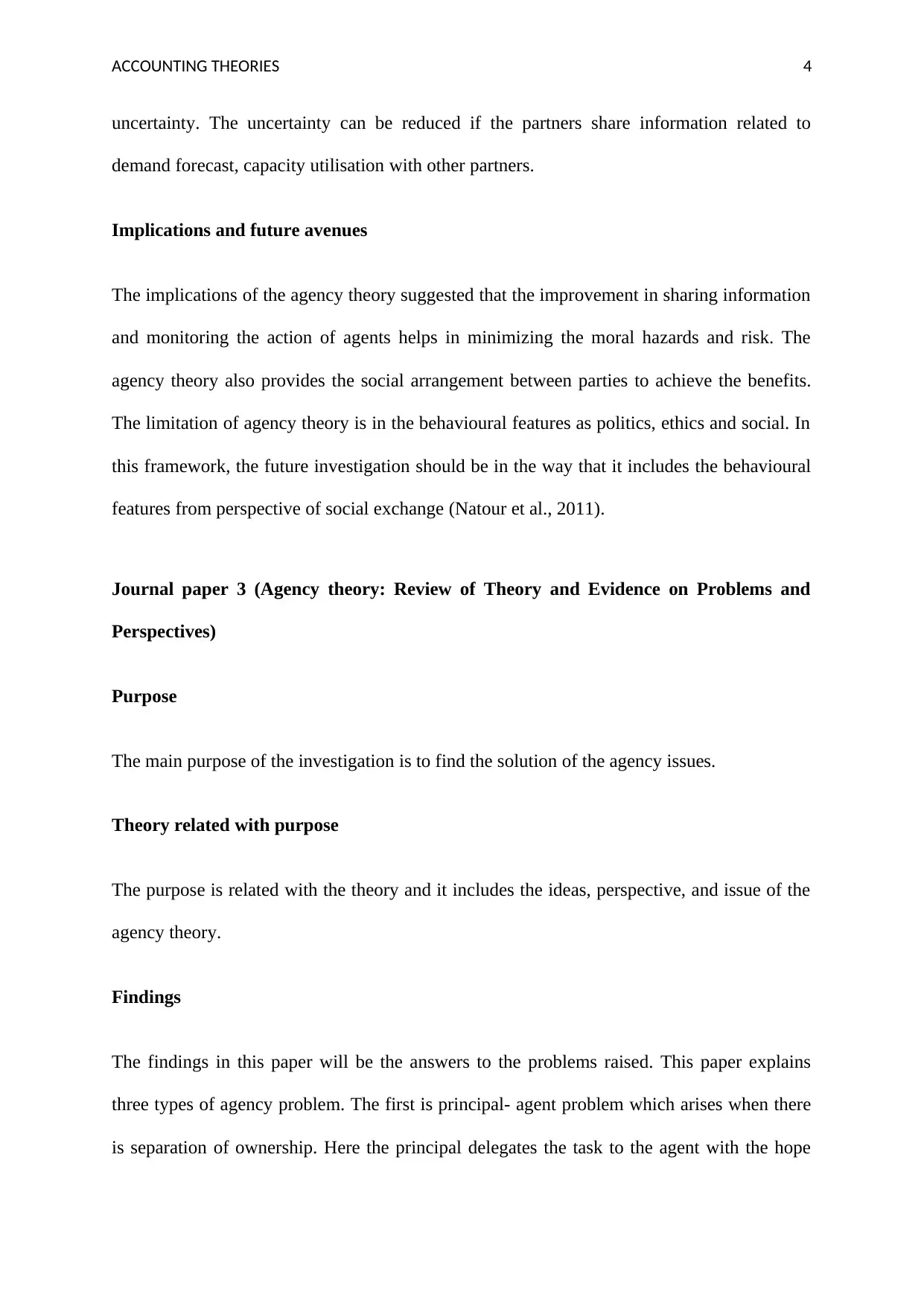
ACCOUNTING THEORIES 4
uncertainty. The uncertainty can be reduced if the partners share information related to
demand forecast, capacity utilisation with other partners.
Implications and future avenues
The implications of the agency theory suggested that the improvement in sharing information
and monitoring the action of agents helps in minimizing the moral hazards and risk. The
agency theory also provides the social arrangement between parties to achieve the benefits.
The limitation of agency theory is in the behavioural features as politics, ethics and social. In
this framework, the future investigation should be in the way that it includes the behavioural
features from perspective of social exchange (Natour et al., 2011).
Journal paper 3 (Agency theory: Review of Theory and Evidence on Problems and
Perspectives)
Purpose
The main purpose of the investigation is to find the solution of the agency issues.
Theory related with purpose
The purpose is related with the theory and it includes the ideas, perspective, and issue of the
agency theory.
Findings
The findings in this paper will be the answers to the problems raised. This paper explains
three types of agency problem. The first is principal- agent problem which arises when there
is separation of ownership. Here the principal delegates the task to the agent with the hope
uncertainty. The uncertainty can be reduced if the partners share information related to
demand forecast, capacity utilisation with other partners.
Implications and future avenues
The implications of the agency theory suggested that the improvement in sharing information
and monitoring the action of agents helps in minimizing the moral hazards and risk. The
agency theory also provides the social arrangement between parties to achieve the benefits.
The limitation of agency theory is in the behavioural features as politics, ethics and social. In
this framework, the future investigation should be in the way that it includes the behavioural
features from perspective of social exchange (Natour et al., 2011).
Journal paper 3 (Agency theory: Review of Theory and Evidence on Problems and
Perspectives)
Purpose
The main purpose of the investigation is to find the solution of the agency issues.
Theory related with purpose
The purpose is related with the theory and it includes the ideas, perspective, and issue of the
agency theory.
Findings
The findings in this paper will be the answers to the problems raised. This paper explains
three types of agency problem. The first is principal- agent problem which arises when there
is separation of ownership. Here the principal delegates the task to the agent with the hope
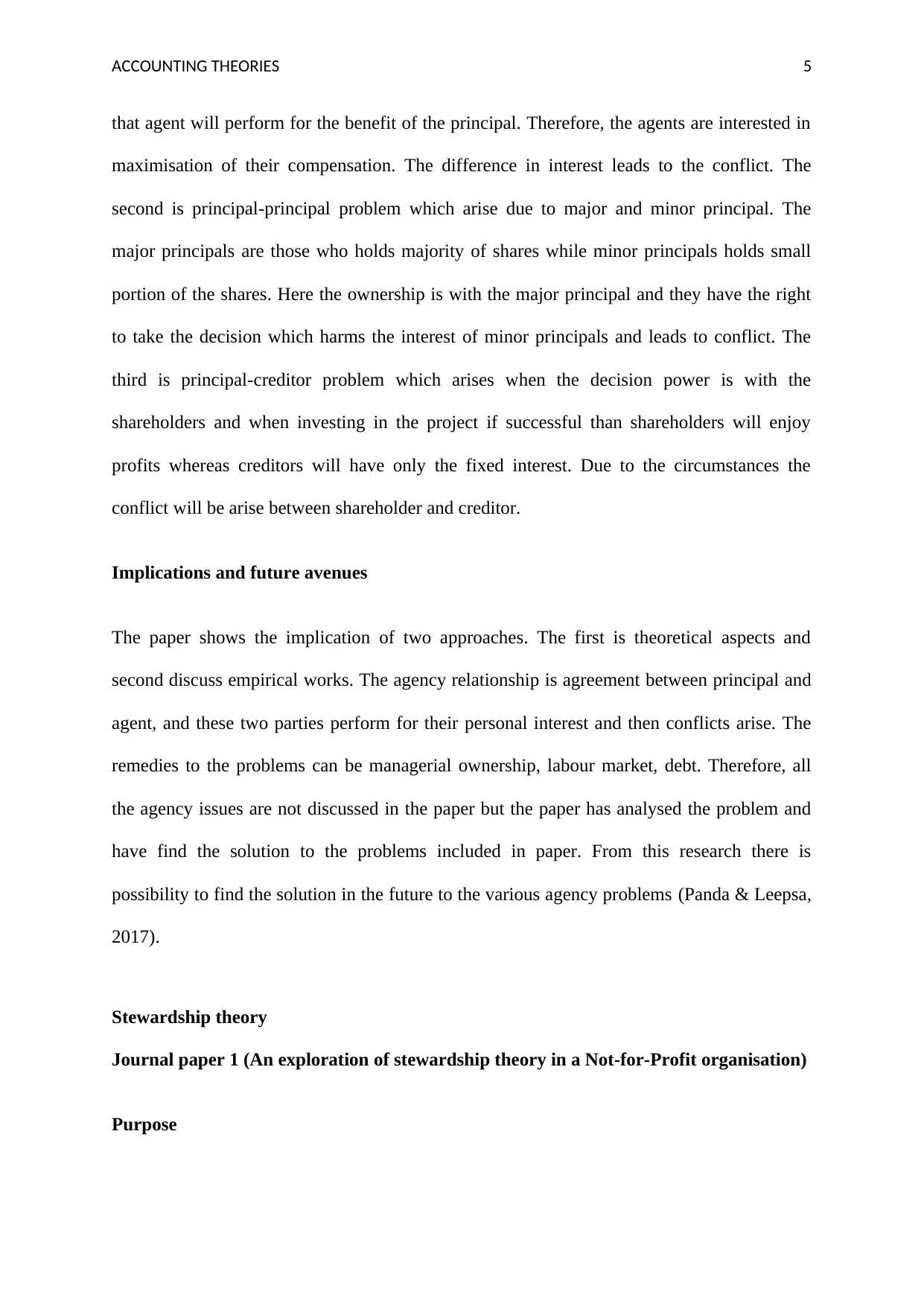
ACCOUNTING THEORIES 5
that agent will perform for the benefit of the principal. Therefore, the agents are interested in
maximisation of their compensation. The difference in interest leads to the conflict. The
second is principal-principal problem which arise due to major and minor principal. The
major principals are those who holds majority of shares while minor principals holds small
portion of the shares. Here the ownership is with the major principal and they have the right
to take the decision which harms the interest of minor principals and leads to conflict. The
third is principal-creditor problem which arises when the decision power is with the
shareholders and when investing in the project if successful than shareholders will enjoy
profits whereas creditors will have only the fixed interest. Due to the circumstances the
conflict will be arise between shareholder and creditor.
Implications and future avenues
The paper shows the implication of two approaches. The first is theoretical aspects and
second discuss empirical works. The agency relationship is agreement between principal and
agent, and these two parties perform for their personal interest and then conflicts arise. The
remedies to the problems can be managerial ownership, labour market, debt. Therefore, all
the agency issues are not discussed in the paper but the paper has analysed the problem and
have find the solution to the problems included in paper. From this research there is
possibility to find the solution in the future to the various agency problems (Panda & Leepsa,
2017).
Stewardship theory
Journal paper 1 (An exploration of stewardship theory in a Not-for-Profit organisation)
Purpose
that agent will perform for the benefit of the principal. Therefore, the agents are interested in
maximisation of their compensation. The difference in interest leads to the conflict. The
second is principal-principal problem which arise due to major and minor principal. The
major principals are those who holds majority of shares while minor principals holds small
portion of the shares. Here the ownership is with the major principal and they have the right
to take the decision which harms the interest of minor principals and leads to conflict. The
third is principal-creditor problem which arises when the decision power is with the
shareholders and when investing in the project if successful than shareholders will enjoy
profits whereas creditors will have only the fixed interest. Due to the circumstances the
conflict will be arise between shareholder and creditor.
Implications and future avenues
The paper shows the implication of two approaches. The first is theoretical aspects and
second discuss empirical works. The agency relationship is agreement between principal and
agent, and these two parties perform for their personal interest and then conflicts arise. The
remedies to the problems can be managerial ownership, labour market, debt. Therefore, all
the agency issues are not discussed in the paper but the paper has analysed the problem and
have find the solution to the problems included in paper. From this research there is
possibility to find the solution in the future to the various agency problems (Panda & Leepsa,
2017).
Stewardship theory
Journal paper 1 (An exploration of stewardship theory in a Not-for-Profit organisation)
Purpose
⊘ This is a preview!⊘
Do you want full access?
Subscribe today to unlock all pages.

Trusted by 1+ million students worldwide
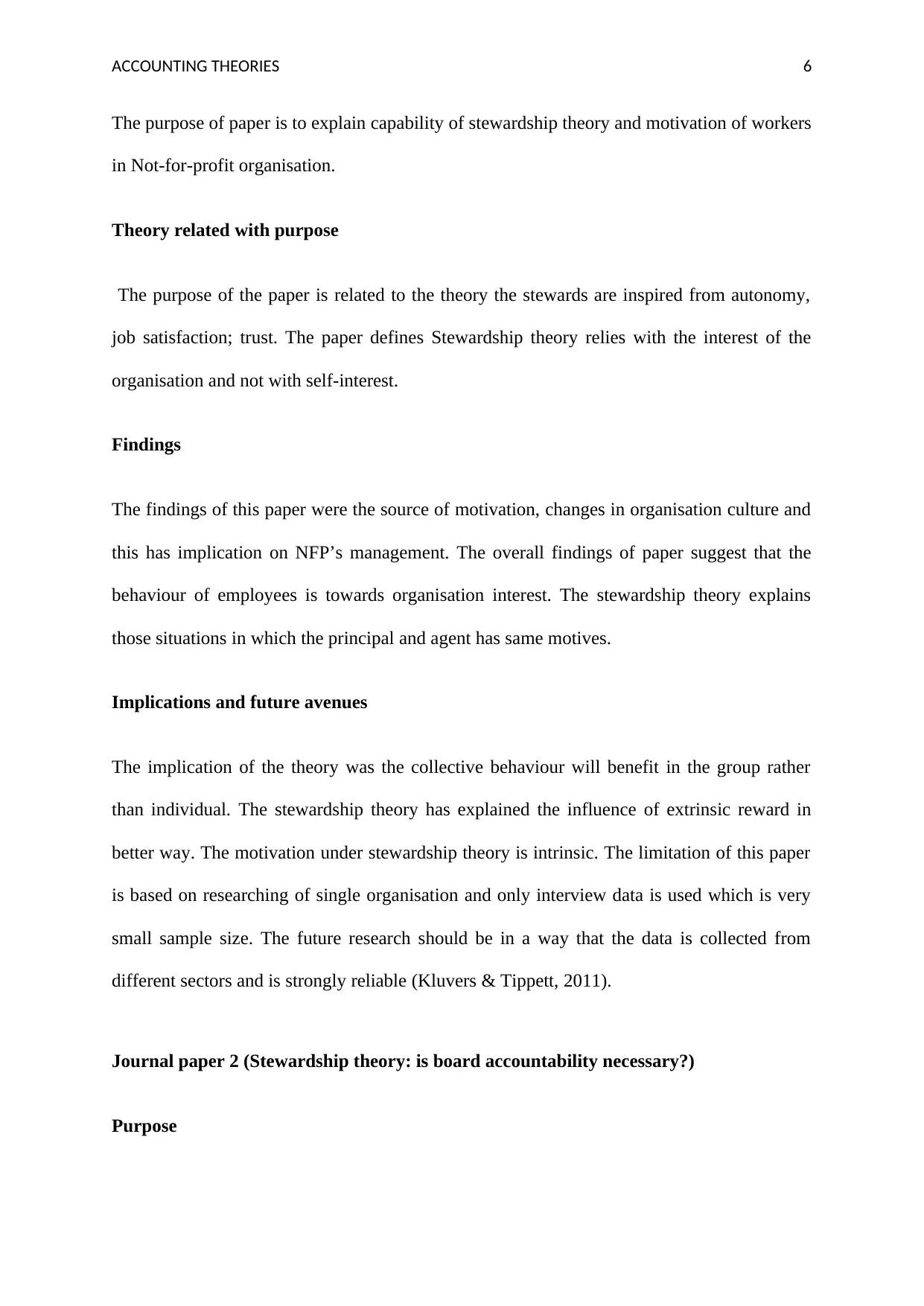
ACCOUNTING THEORIES 6
The purpose of paper is to explain capability of stewardship theory and motivation of workers
in Not-for-profit organisation.
Theory related with purpose
The purpose of the paper is related to the theory the stewards are inspired from autonomy,
job satisfaction; trust. The paper defines Stewardship theory relies with the interest of the
organisation and not with self-interest.
Findings
The findings of this paper were the source of motivation, changes in organisation culture and
this has implication on NFP’s management. The overall findings of paper suggest that the
behaviour of employees is towards organisation interest. The stewardship theory explains
those situations in which the principal and agent has same motives.
Implications and future avenues
The implication of the theory was the collective behaviour will benefit in the group rather
than individual. The stewardship theory has explained the influence of extrinsic reward in
better way. The motivation under stewardship theory is intrinsic. The limitation of this paper
is based on researching of single organisation and only interview data is used which is very
small sample size. The future research should be in a way that the data is collected from
different sectors and is strongly reliable (Kluvers & Tippett, 2011).
Journal paper 2 (Stewardship theory: is board accountability necessary?)
Purpose
The purpose of paper is to explain capability of stewardship theory and motivation of workers
in Not-for-profit organisation.
Theory related with purpose
The purpose of the paper is related to the theory the stewards are inspired from autonomy,
job satisfaction; trust. The paper defines Stewardship theory relies with the interest of the
organisation and not with self-interest.
Findings
The findings of this paper were the source of motivation, changes in organisation culture and
this has implication on NFP’s management. The overall findings of paper suggest that the
behaviour of employees is towards organisation interest. The stewardship theory explains
those situations in which the principal and agent has same motives.
Implications and future avenues
The implication of the theory was the collective behaviour will benefit in the group rather
than individual. The stewardship theory has explained the influence of extrinsic reward in
better way. The motivation under stewardship theory is intrinsic. The limitation of this paper
is based on researching of single organisation and only interview data is used which is very
small sample size. The future research should be in a way that the data is collected from
different sectors and is strongly reliable (Kluvers & Tippett, 2011).
Journal paper 2 (Stewardship theory: is board accountability necessary?)
Purpose
Paraphrase This Document
Need a fresh take? Get an instant paraphrase of this document with our AI Paraphraser
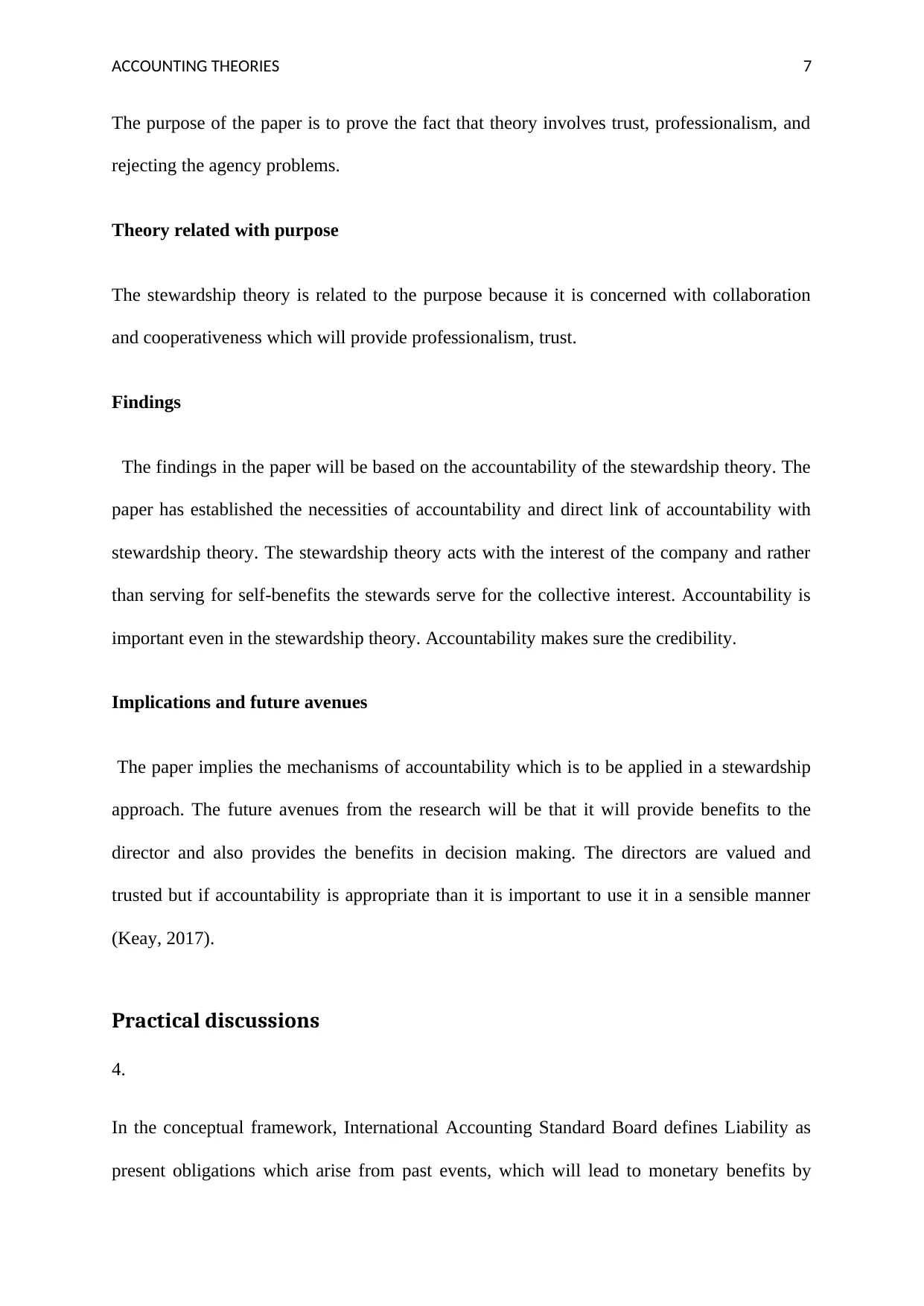
ACCOUNTING THEORIES 7
The purpose of the paper is to prove the fact that theory involves trust, professionalism, and
rejecting the agency problems.
Theory related with purpose
The stewardship theory is related to the purpose because it is concerned with collaboration
and cooperativeness which will provide professionalism, trust.
Findings
The findings in the paper will be based on the accountability of the stewardship theory. The
paper has established the necessities of accountability and direct link of accountability with
stewardship theory. The stewardship theory acts with the interest of the company and rather
than serving for self-benefits the stewards serve for the collective interest. Accountability is
important even in the stewardship theory. Accountability makes sure the credibility.
Implications and future avenues
The paper implies the mechanisms of accountability which is to be applied in a stewardship
approach. The future avenues from the research will be that it will provide benefits to the
director and also provides the benefits in decision making. The directors are valued and
trusted but if accountability is appropriate than it is important to use it in a sensible manner
(Keay, 2017).
Practical discussions
4.
In the conceptual framework, International Accounting Standard Board defines Liability as
present obligations which arise from past events, which will lead to monetary benefits by
The purpose of the paper is to prove the fact that theory involves trust, professionalism, and
rejecting the agency problems.
Theory related with purpose
The stewardship theory is related to the purpose because it is concerned with collaboration
and cooperativeness which will provide professionalism, trust.
Findings
The findings in the paper will be based on the accountability of the stewardship theory. The
paper has established the necessities of accountability and direct link of accountability with
stewardship theory. The stewardship theory acts with the interest of the company and rather
than serving for self-benefits the stewards serve for the collective interest. Accountability is
important even in the stewardship theory. Accountability makes sure the credibility.
Implications and future avenues
The paper implies the mechanisms of accountability which is to be applied in a stewardship
approach. The future avenues from the research will be that it will provide benefits to the
director and also provides the benefits in decision making. The directors are valued and
trusted but if accountability is appropriate than it is important to use it in a sensible manner
(Keay, 2017).
Practical discussions
4.
In the conceptual framework, International Accounting Standard Board defines Liability as
present obligations which arise from past events, which will lead to monetary benefits by
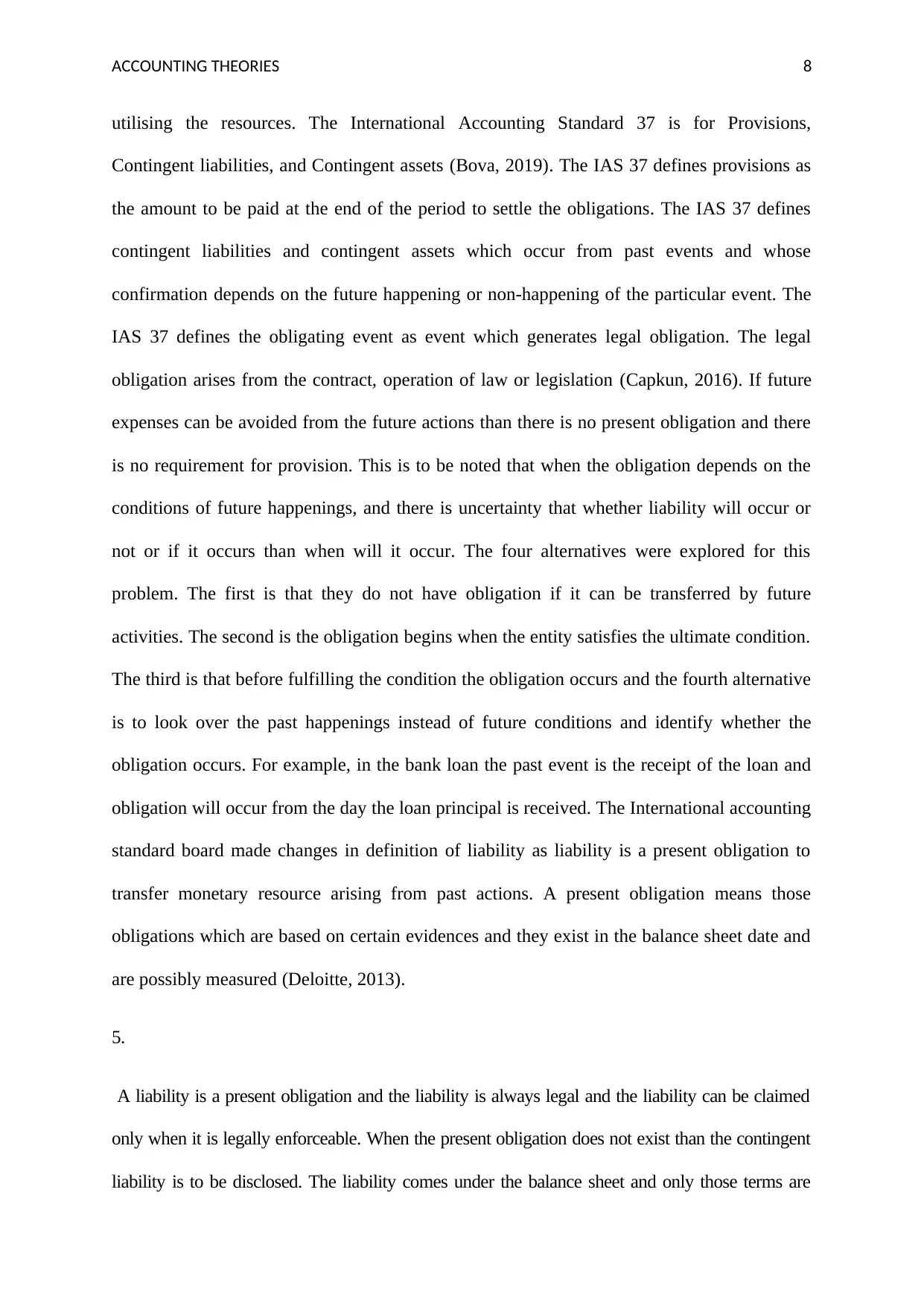
ACCOUNTING THEORIES 8
utilising the resources. The International Accounting Standard 37 is for Provisions,
Contingent liabilities, and Contingent assets (Bova, 2019). The IAS 37 defines provisions as
the amount to be paid at the end of the period to settle the obligations. The IAS 37 defines
contingent liabilities and contingent assets which occur from past events and whose
confirmation depends on the future happening or non-happening of the particular event. The
IAS 37 defines the obligating event as event which generates legal obligation. The legal
obligation arises from the contract, operation of law or legislation (Capkun, 2016). If future
expenses can be avoided from the future actions than there is no present obligation and there
is no requirement for provision. This is to be noted that when the obligation depends on the
conditions of future happenings, and there is uncertainty that whether liability will occur or
not or if it occurs than when will it occur. The four alternatives were explored for this
problem. The first is that they do not have obligation if it can be transferred by future
activities. The second is the obligation begins when the entity satisfies the ultimate condition.
The third is that before fulfilling the condition the obligation occurs and the fourth alternative
is to look over the past happenings instead of future conditions and identify whether the
obligation occurs. For example, in the bank loan the past event is the receipt of the loan and
obligation will occur from the day the loan principal is received. The International accounting
standard board made changes in definition of liability as liability is a present obligation to
transfer monetary resource arising from past actions. A present obligation means those
obligations which are based on certain evidences and they exist in the balance sheet date and
are possibly measured (Deloitte, 2013).
5.
A liability is a present obligation and the liability is always legal and the liability can be claimed
only when it is legally enforceable. When the present obligation does not exist than the contingent
liability is to be disclosed. The liability comes under the balance sheet and only those terms are
utilising the resources. The International Accounting Standard 37 is for Provisions,
Contingent liabilities, and Contingent assets (Bova, 2019). The IAS 37 defines provisions as
the amount to be paid at the end of the period to settle the obligations. The IAS 37 defines
contingent liabilities and contingent assets which occur from past events and whose
confirmation depends on the future happening or non-happening of the particular event. The
IAS 37 defines the obligating event as event which generates legal obligation. The legal
obligation arises from the contract, operation of law or legislation (Capkun, 2016). If future
expenses can be avoided from the future actions than there is no present obligation and there
is no requirement for provision. This is to be noted that when the obligation depends on the
conditions of future happenings, and there is uncertainty that whether liability will occur or
not or if it occurs than when will it occur. The four alternatives were explored for this
problem. The first is that they do not have obligation if it can be transferred by future
activities. The second is the obligation begins when the entity satisfies the ultimate condition.
The third is that before fulfilling the condition the obligation occurs and the fourth alternative
is to look over the past happenings instead of future conditions and identify whether the
obligation occurs. For example, in the bank loan the past event is the receipt of the loan and
obligation will occur from the day the loan principal is received. The International accounting
standard board made changes in definition of liability as liability is a present obligation to
transfer monetary resource arising from past actions. A present obligation means those
obligations which are based on certain evidences and they exist in the balance sheet date and
are possibly measured (Deloitte, 2013).
5.
A liability is a present obligation and the liability is always legal and the liability can be claimed
only when it is legally enforceable. When the present obligation does not exist than the contingent
liability is to be disclosed. The liability comes under the balance sheet and only those terms are
⊘ This is a preview!⊘
Do you want full access?
Subscribe today to unlock all pages.

Trusted by 1+ million students worldwide
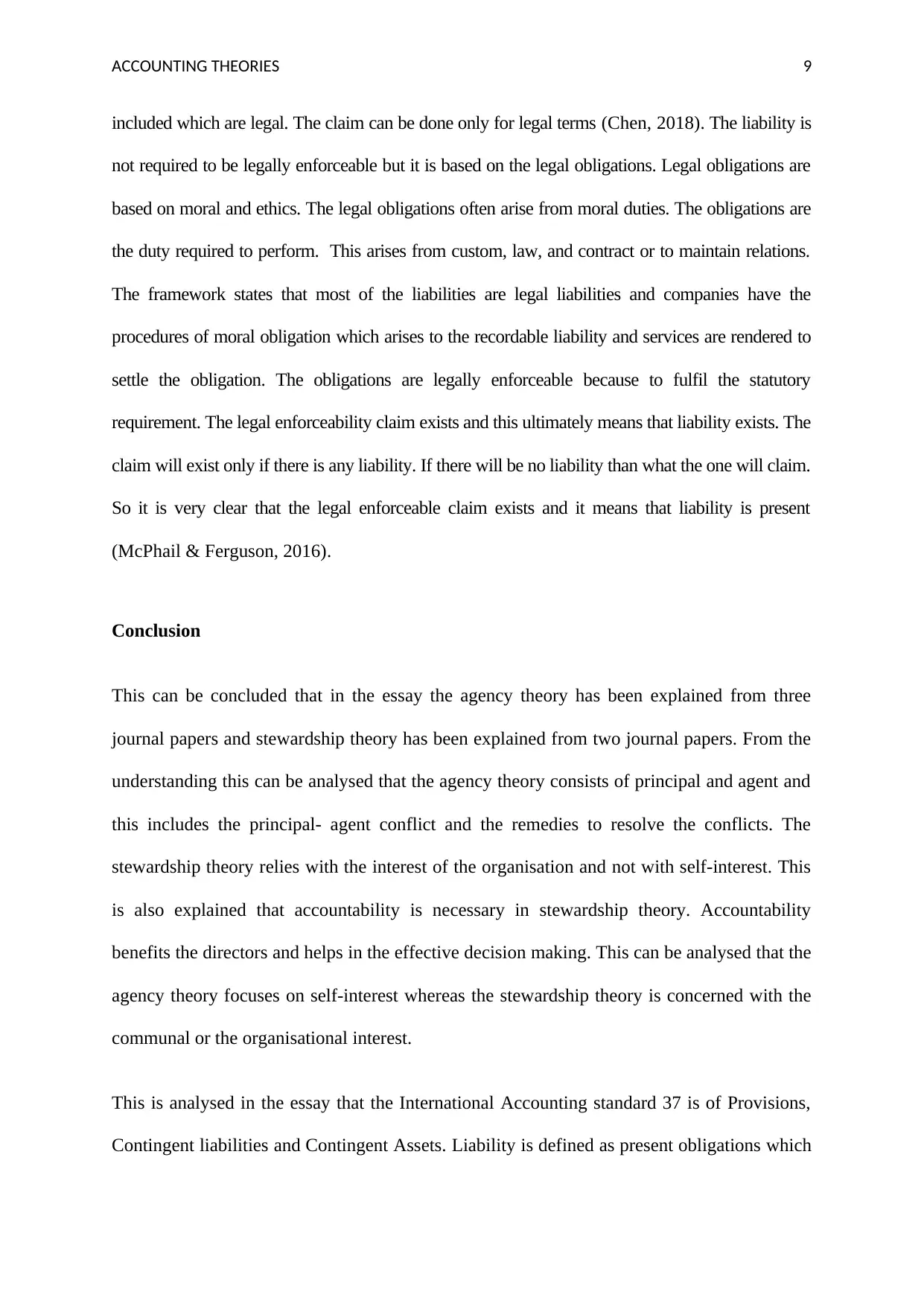
ACCOUNTING THEORIES 9
included which are legal. The claim can be done only for legal terms (Chen, 2018). The liability is
not required to be legally enforceable but it is based on the legal obligations. Legal obligations are
based on moral and ethics. The legal obligations often arise from moral duties. The obligations are
the duty required to perform. This arises from custom, law, and contract or to maintain relations.
The framework states that most of the liabilities are legal liabilities and companies have the
procedures of moral obligation which arises to the recordable liability and services are rendered to
settle the obligation. The obligations are legally enforceable because to fulfil the statutory
requirement. The legal enforceability claim exists and this ultimately means that liability exists. The
claim will exist only if there is any liability. If there will be no liability than what the one will claim.
So it is very clear that the legal enforceable claim exists and it means that liability is present
(McPhail & Ferguson, 2016).
Conclusion
This can be concluded that in the essay the agency theory has been explained from three
journal papers and stewardship theory has been explained from two journal papers. From the
understanding this can be analysed that the agency theory consists of principal and agent and
this includes the principal- agent conflict and the remedies to resolve the conflicts. The
stewardship theory relies with the interest of the organisation and not with self-interest. This
is also explained that accountability is necessary in stewardship theory. Accountability
benefits the directors and helps in the effective decision making. This can be analysed that the
agency theory focuses on self-interest whereas the stewardship theory is concerned with the
communal or the organisational interest.
This is analysed in the essay that the International Accounting standard 37 is of Provisions,
Contingent liabilities and Contingent Assets. Liability is defined as present obligations which
included which are legal. The claim can be done only for legal terms (Chen, 2018). The liability is
not required to be legally enforceable but it is based on the legal obligations. Legal obligations are
based on moral and ethics. The legal obligations often arise from moral duties. The obligations are
the duty required to perform. This arises from custom, law, and contract or to maintain relations.
The framework states that most of the liabilities are legal liabilities and companies have the
procedures of moral obligation which arises to the recordable liability and services are rendered to
settle the obligation. The obligations are legally enforceable because to fulfil the statutory
requirement. The legal enforceability claim exists and this ultimately means that liability exists. The
claim will exist only if there is any liability. If there will be no liability than what the one will claim.
So it is very clear that the legal enforceable claim exists and it means that liability is present
(McPhail & Ferguson, 2016).
Conclusion
This can be concluded that in the essay the agency theory has been explained from three
journal papers and stewardship theory has been explained from two journal papers. From the
understanding this can be analysed that the agency theory consists of principal and agent and
this includes the principal- agent conflict and the remedies to resolve the conflicts. The
stewardship theory relies with the interest of the organisation and not with self-interest. This
is also explained that accountability is necessary in stewardship theory. Accountability
benefits the directors and helps in the effective decision making. This can be analysed that the
agency theory focuses on self-interest whereas the stewardship theory is concerned with the
communal or the organisational interest.
This is analysed in the essay that the International Accounting standard 37 is of Provisions,
Contingent liabilities and Contingent Assets. Liability is defined as present obligations which
Paraphrase This Document
Need a fresh take? Get an instant paraphrase of this document with our AI Paraphraser
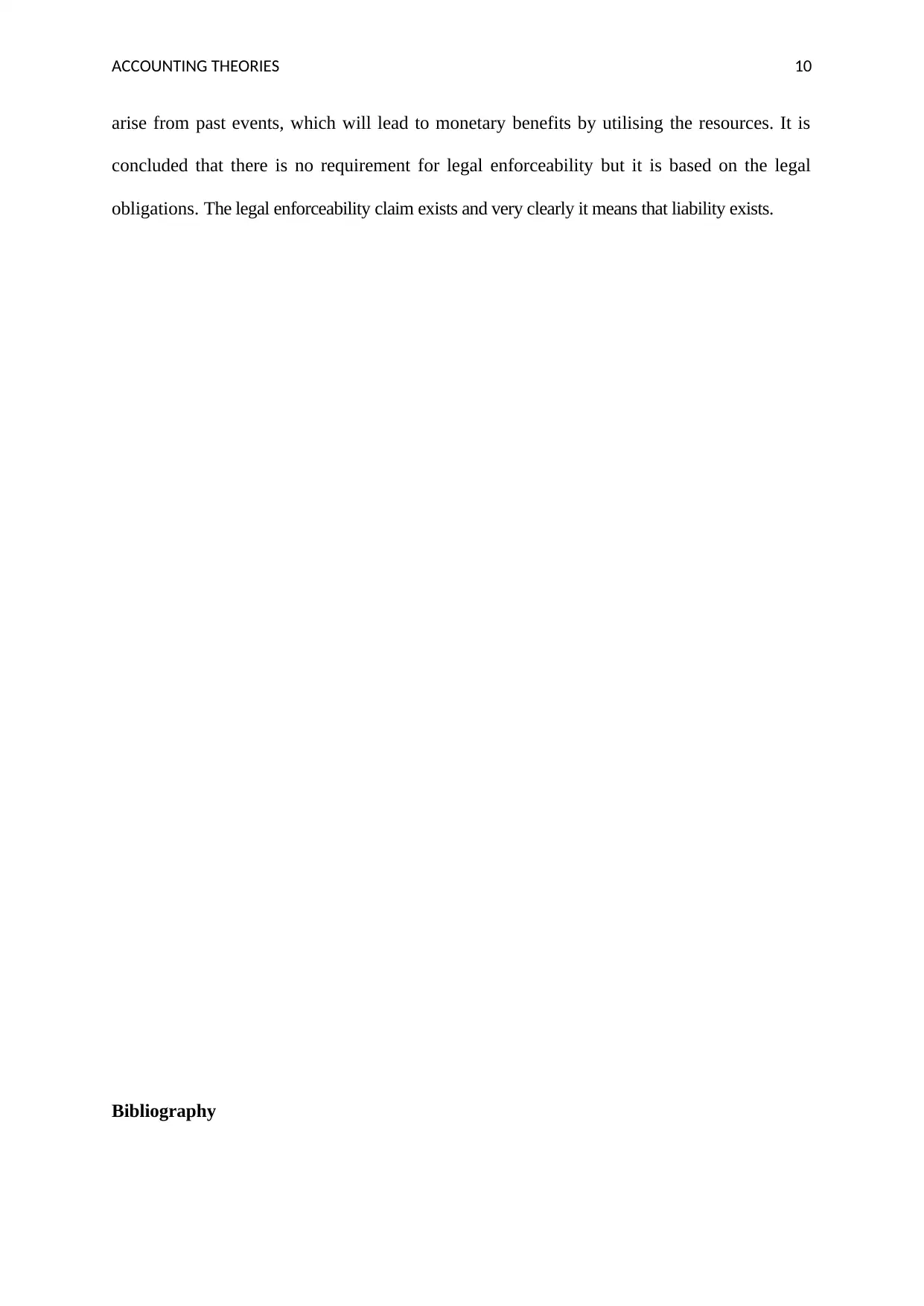
ACCOUNTING THEORIES 10
arise from past events, which will lead to monetary benefits by utilising the resources. It is
concluded that there is no requirement for legal enforceability but it is based on the legal
obligations. The legal enforceability claim exists and very clearly it means that liability exists.
Bibliography
arise from past events, which will lead to monetary benefits by utilising the resources. It is
concluded that there is no requirement for legal enforceability but it is based on the legal
obligations. The legal enforceability claim exists and very clearly it means that liability exists.
Bibliography
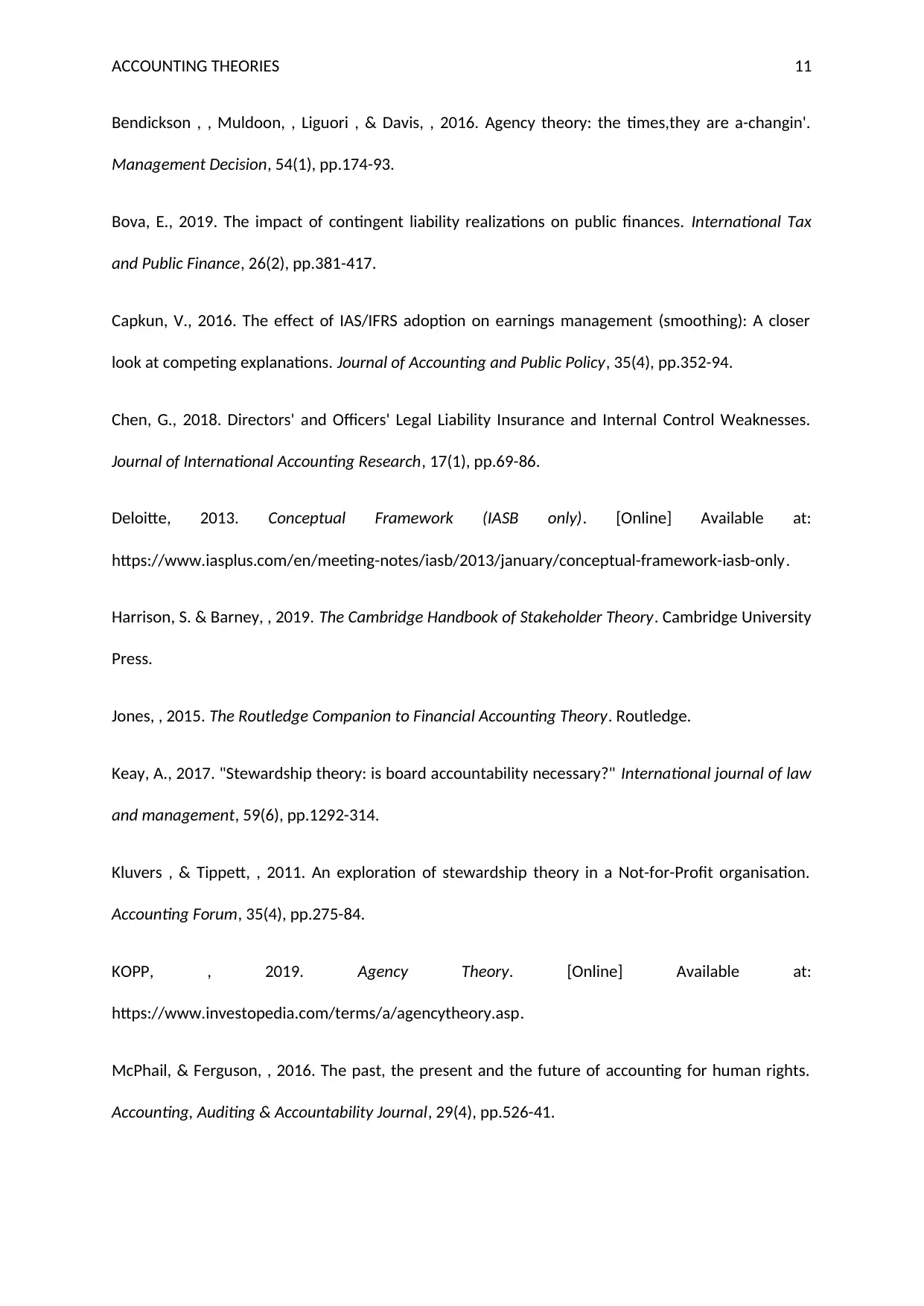
ACCOUNTING THEORIES 11
Bendickson , , Muldoon, , Liguori , & Davis, , 2016. Agency theory: the times,they are a-changin'.
Management Decision, 54(1), pp.174-93.
Bova, E., 2019. The impact of contingent liability realizations on public finances. International Tax
and Public Finance, 26(2), pp.381-417.
Capkun, V., 2016. The effect of IAS/IFRS adoption on earnings management (smoothing): A closer
look at competing explanations. Journal of Accounting and Public Policy, 35(4), pp.352-94.
Chen, G., 2018. Directors' and Officers' Legal Liability Insurance and Internal Control Weaknesses.
Journal of International Accounting Research, 17(1), pp.69-86.
Deloitte, 2013. Conceptual Framework (IASB only). [Online] Available at:
https://www.iasplus.com/en/meeting-notes/iasb/2013/january/conceptual-framework-iasb-only.
Harrison, S. & Barney, , 2019. The Cambridge Handbook of Stakeholder Theory. Cambridge University
Press.
Jones, , 2015. The Routledge Companion to Financial Accounting Theory. Routledge.
Keay, A., 2017. "Stewardship theory: is board accountability necessary?" International journal of law
and management, 59(6), pp.1292-314.
Kluvers , & Tippett, , 2011. An exploration of stewardship theory in a Not-for-Profit organisation.
Accounting Forum, 35(4), pp.275-84.
KOPP, , 2019. Agency Theory. [Online] Available at:
https://www.investopedia.com/terms/a/agencytheory.asp.
McPhail, & Ferguson, , 2016. The past, the present and the future of accounting for human rights.
Accounting, Auditing & Accountability Journal, 29(4), pp.526-41.
Bendickson , , Muldoon, , Liguori , & Davis, , 2016. Agency theory: the times,they are a-changin'.
Management Decision, 54(1), pp.174-93.
Bova, E., 2019. The impact of contingent liability realizations on public finances. International Tax
and Public Finance, 26(2), pp.381-417.
Capkun, V., 2016. The effect of IAS/IFRS adoption on earnings management (smoothing): A closer
look at competing explanations. Journal of Accounting and Public Policy, 35(4), pp.352-94.
Chen, G., 2018. Directors' and Officers' Legal Liability Insurance and Internal Control Weaknesses.
Journal of International Accounting Research, 17(1), pp.69-86.
Deloitte, 2013. Conceptual Framework (IASB only). [Online] Available at:
https://www.iasplus.com/en/meeting-notes/iasb/2013/january/conceptual-framework-iasb-only.
Harrison, S. & Barney, , 2019. The Cambridge Handbook of Stakeholder Theory. Cambridge University
Press.
Jones, , 2015. The Routledge Companion to Financial Accounting Theory. Routledge.
Keay, A., 2017. "Stewardship theory: is board accountability necessary?" International journal of law
and management, 59(6), pp.1292-314.
Kluvers , & Tippett, , 2011. An exploration of stewardship theory in a Not-for-Profit organisation.
Accounting Forum, 35(4), pp.275-84.
KOPP, , 2019. Agency Theory. [Online] Available at:
https://www.investopedia.com/terms/a/agencytheory.asp.
McPhail, & Ferguson, , 2016. The past, the present and the future of accounting for human rights.
Accounting, Auditing & Accountability Journal, 29(4), pp.526-41.
⊘ This is a preview!⊘
Do you want full access?
Subscribe today to unlock all pages.

Trusted by 1+ million students worldwide
1 out of 13
Related Documents
Your All-in-One AI-Powered Toolkit for Academic Success.
+13062052269
info@desklib.com
Available 24*7 on WhatsApp / Email
![[object Object]](/_next/static/media/star-bottom.7253800d.svg)
Unlock your academic potential
Copyright © 2020–2026 A2Z Services. All Rights Reserved. Developed and managed by ZUCOL.





